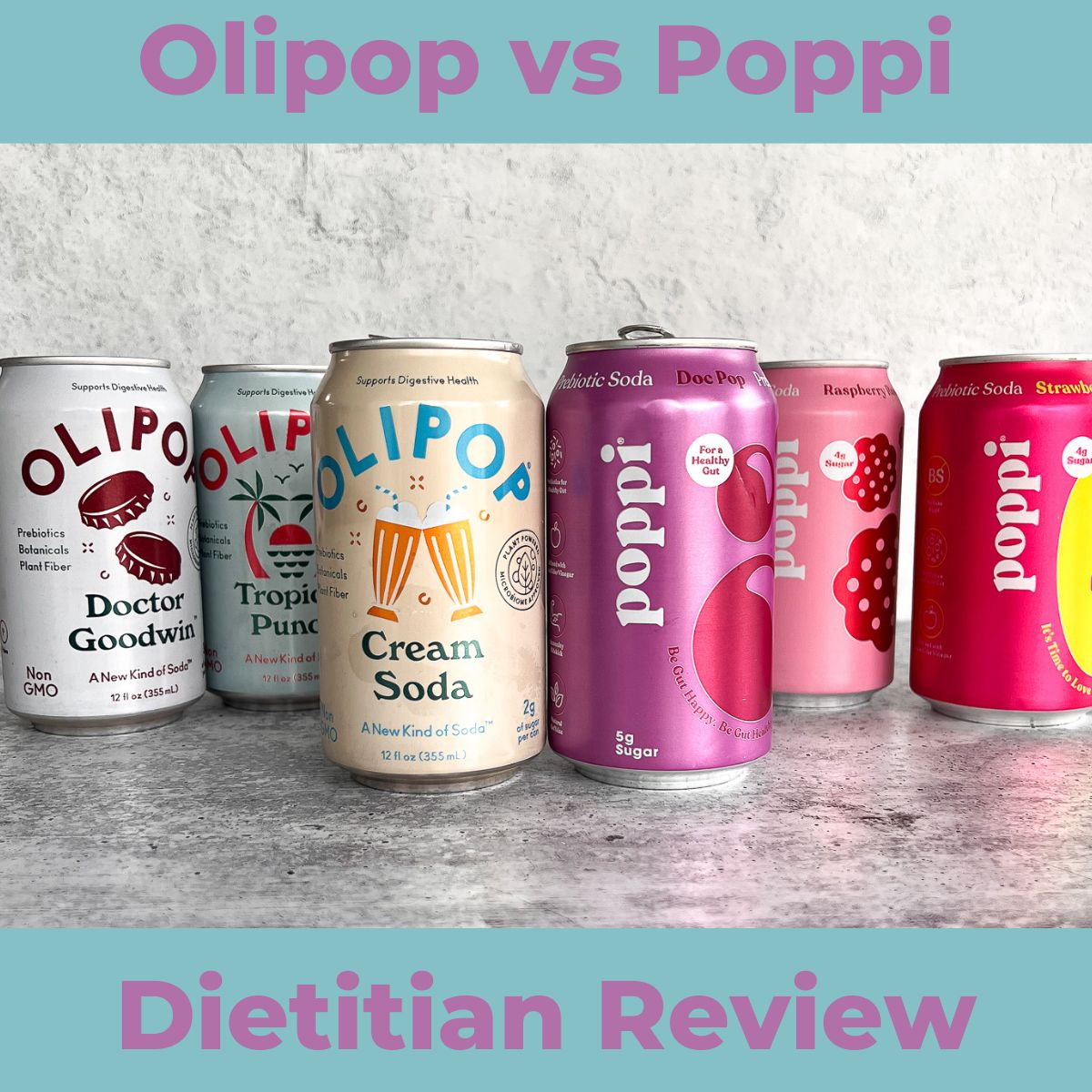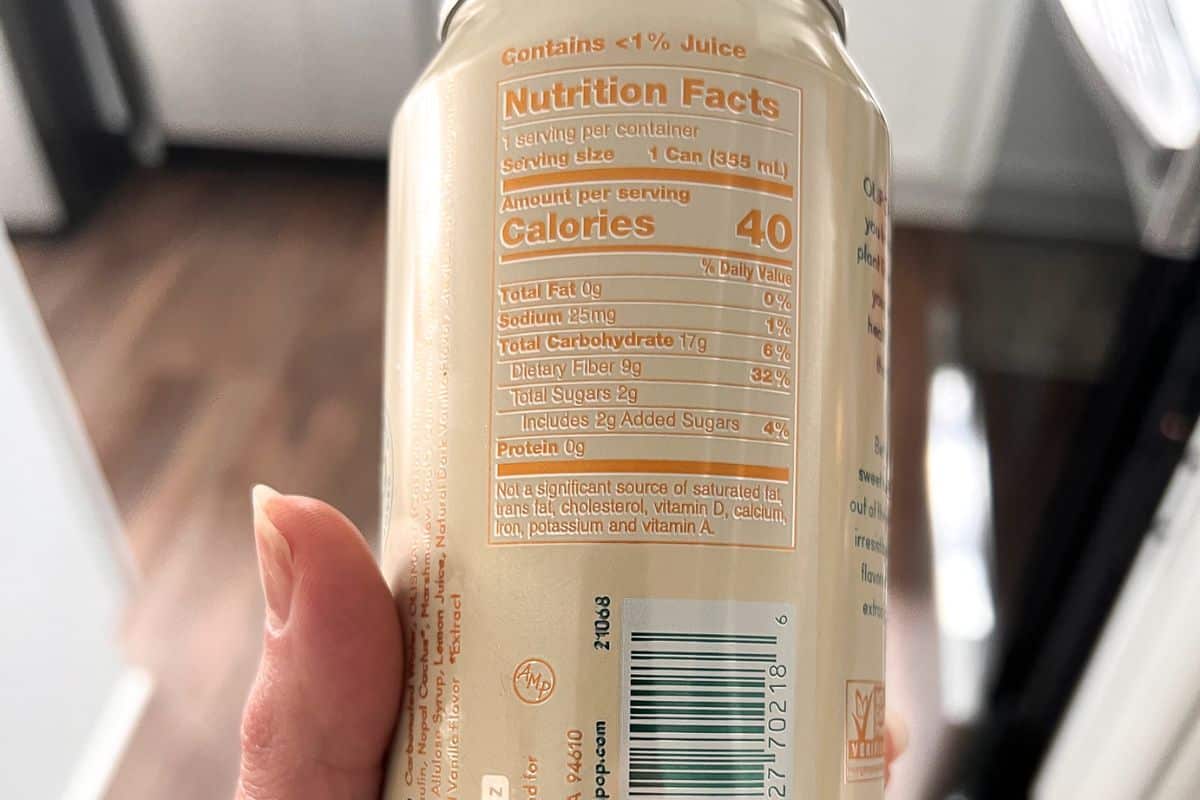As two of the most popular prebiotic sodas on the market, you may wonder which is better. We’re comparing the ingredients, nutrition, and value of Olipop vs Poppi so you can choose the best prebiotic drink for you!

If you’re thinking of ditching soda (or pop as I call it here in Michigan), you may have heard of prebiotic drinks, particularly two of the most popular and widely available brands, Olipop and Poppi. These drinks have all the fizz but much less sugar and calories than regular soda. They also have a few beneficial ingredients, including prebiotic fibers that nourish your gut microbiome.
This post may contain affiliate links, which means I may receive a small commission if you click and purchase from the link (at no cost to you!). See full affiliate information here.
Jump to:
What Are Prebiotics?
If you’ve recently heard about prebiotics everywhere you turn, you’re not imagining things! Gut health is one of the top health trends in recent years, and it’s not going anywhere soon. Research has found that the health of your gut is linked to everything from digestive health to weight, diabetes, heart disease, and depression.
A major part of keeping your gut healthy is keeping the bacteria that live in it well-fed. Prebiotic fibers do just that. When you eat foods that contain prebiotics, those fibers pass through your digestive system intact.
Once they reach your large intestine, the bacteria there are able to ferment those fibers, releasing compounds like short-chain fatty acids (SCFAs) that then go on to influence things like inflammation and your immune system and support your brain, heart, and liver health.
Prebiotics are found in foods like apples, bananas, asparagus, oats, garlic, chicory root, Jerusalem artichoke, wheat, and onions. You’ll also see prebiotics added to foods with ingredients including inulin, wheat dextrin, acacia gum, psyllium, and polydextrose.
All About Poppi Prebiotic Soda
Poppi was launched in early 2020 by a Texas husband-and-wife duo as a healthier way to enjoy soda. It got its big break after appearing on Shark Tank. Now, it’s one of the most widely available prebiotic drinks on the market.

Nutrition Facts
Each 12-ounce can of Poppi soda has 25 calories and 5 grams or less of added sugars. It also has 2 grams of fiber, making it much lower in calories and sugar and much higher in fiber than regular soda.
Here are the nutrition facts for one of their popular flavors, Strawberry Lemon:
Per 12-ounce can:
- Calories: 25
- Fat: 0 grams
- Protein: 0 grams
- Carbohydrates: 7 grams
- Sugar: 4 grams
- Added Sugar: 4 grams
- Fiber: 2 grams
The Ingredients
Poppi has a pretty short and straightforward ingredient list that stays consistent for all its flavors. Here is what you’ll find in a can of Poppi:
- Sparkling water: Sparkling water serves as the base for this prebiotic drink, giving it the fizz you’d expect from a soda. Sparkling water is made by infusing regular water with pressurized carbon dioxide. Like regular water, sparkling water aids in hydration.
- Organic cane sugar: Poppi has 5 grams or less of added sugars from cane sugar. This helps the soda taste sweet but adds much less sugar than you’d get with competing sodas. For reference, a 12-ounce can of Coca-Cola has 39 grams of added sugars. Even though it is organic, it has the same effect on your blood sugar as regular cane sugar or sugar from sugar beets.
- Organic apple cider vinegar: Apple cider vinegar is added to every can of Poppi for a pop of tangy flavor and a little boost of probiotics (although not enough or specific ones that probiotics are listed on the label). The apple cider vinegar brings out the flavors and doesn’t overpower them – so far, I haven’t detected any “vinegar” tastes in the drinks I’ve tried.
- Organic agave inulin: Agave inulin makes this a prebiotic soda. Researchers found that including anywhere from 5 to 7.5 grams of agave inulin per day for three weeks resulted in a 3 to 4-fold increase in the beneficial gut bacteria bifidobacterium and a 40 percent decrease in the detrimental bacteria Desulfovibrio.
- Natural flavors: Natural flavors are oils or essences extracted from plant or animal products. Since Poppi states that its product is vegan (although it’s not currently certified vegan), we can assume that it uses natural flavors from plants only.
- Fruit juices: Depending on the flavor, various fruit juices are used in small amounts to add to the flavor of the drinks.
- Stevia concentrate: For extra sweetness without additional added sugar, stevia is added. Stevia is a natural, non-nutritive sweetener that’s 250 to 300 times sweeter than table sugar. Studies have found that stevia extract does not increase blood glucose levels and may actually have a small glucose-lowering effect.
Flavors
With Poppi, you’ll find a mixture of fruity flavors and flavors reminiscent of popular sodas. They currently (April 2024) have 11 flavors to choose from.
- Wildberry
- Strawberry Lemon
- Orange
- Doc Pop
- Ginger Lime
- Raspberry Rose
- Grape
- Cherry Limeade
- Watermelon
- Classic Cola
- Rootbeer
Price and Availability
Poppi is available at many large grocery stores, including Walmart, Target, Costco and Sam’s Club. You can likely find it in smaller local stores as well. It retails between $2.00 to $2.50 a can. You can buy a 12-pack of their popular Short List Variety Pack on Amazon for $26.99 or $2.25 per can.
All About Olipop Prebiotic Soda
Olipop hit the market in 2018 but became increasingly popular during 2020 when they took their marketing to social media. This brand was created as a way to make gut-healthy nutrients enjoyable and delicious – and they’ve been able to do just that. Here is everything you need to know about Olipop soda.

Nutrition Facts
The many flavors of Olipop have between 35 and 50 calories per 12-ounce can, along with 9 grams of fiber and just 2 to 5 grams of added sugars. Here is the nutrition facts for a 12-ounce can of Cream Soda (my personal favorite):
- Calories: 40
- Fat: 0 grams
- Protein: 0 grams
- Carbohydrates: 17 grams
- Sugar: 2 grams
- Added Sugar: 2 grams
- Fiber: 9 grams
The Ingredients
All Olipop flavors include their OLISMART concoction of cassava root fiber, chicory root inulin, Jerusalem artichoke inulin, as well as extracts of nopal cactus, marshmallow root, calendula flower, and kudzu root. These ingredients make up the gut-healthy prebiotic blend that adds 9 grams of fiber to each can. Other ingredients add sweetness and flavor.
- Carbonated water: The fizz in this drink comes from water that’s been carbonated – just like sparkling water.
- Cassava root fiber and syrup: Cassava is a root vegetable that’s rich in prebiotic fibers.
- Chicory root inulin: Research has found that chicory root promotes digestion, can help regulate appetite, and reduces the risk of gastrointestinal diseases, although some people may be sensitive to its effects, leading to stomach upset if too much is eaten.
- Jerusalem artichoke inulin: Jerusalem artichokes are a good source of the prebiotic fiber inulin. Animal studies have found evidence that this ingredient may change the microbiome in a way that helps to reduce high blood sugar.
- Nopal cactus extract: Aka prickly pear cactus is a good source of fiber and has anti-inflammatory, antioxidant, antimicrobial, and neuroprotective properties.
- Marshmallow root extract: Marshmallow root extract is rich in antioxidants and good for the gut by aiding digestion and may help relieve inflammation in the digestive tract.
- Calendula flower extract: Calendula is an herb that has traditionally been used to soothe stomach upset and ulcers, although research on this is limited. What we do know is that calendula is rich in beneficial bioactive plant compounds, has anti-inflammatory and antioxidant properties.
- Kudzu root extract: Known to reduce inflammation and can help protect the liver.
- Allulose syrup: Allulose is an alternative to sugar that has 90% fewer calories and may actually have blood sugar-lowering effects. It’s a sugar that’s naturally found in foods like molasses and raisins. Plus, since allulose isn’t digestive in the mouth like sugar is, it won’t contribute to cavities!
- Juices and juice concentrate: Various fruit juices and juice concentrates are used depending on the flavor.
- Natural flavors: Olipop specifies where these natural flavors (essences or extracts) come from, so you know whether they’re from spices or fruits. Since this soda is certified vegan, you can be assured none comes from animal products.
- Stevia leaf: Stevia is a natural non-nutritive sweetener that’s used to add a sweeter taste without extra sugar.
- Himalayan pink salt: Olipop has a little salt added (not much, as most have just 1% of the DV of sodium) to help bring out the other flavors in the drink.
Some flavors also include caffeine from green tea.
Flavors
Olipop currently has 16 flavors, including popular soda copy-cats and unique fruit flavors.
- Classic Root Beer
- Vintage Cola
- Cream Soda
- Classic Grape
- Crisp Apple
- Ginger Ale
- Strawberry Vanilla
- Cherry Cola
- Orange Squeeze
- Lemon Lime
- Ginger Lemon
- Doctor Goodwin
- Watermelon Lime
- Banana Cream
- Cherry Vanilla
- Tropical Punch
Price and Availability
Olipop is available at several large retailers, including Walmart, Target, Costco, Sam’s Club, and many regional grocers. In-store prices range from $1.73 to $3.00 per can. On Amazon, you can get a 12-pack of their best-selling variety pack for $35.99 or $3.00 per can.
Poppi vs Olipop Head-to-Head Comparison
| Poppi | Olipop | |
| Calories | 25 | 35-50 |
| Fiber | 2 grams | 9 grams |
| Added Sugars | 5 grams or less | 5 grams or less |
| Flavors | 11 | 16 |
| Price | $2.00 to $2.50 | $1.73 to $3.00 |
| Availability | Nationwide and online | Nationwide and online |
For more information on prebiotic sodas, who should drink them, potential concerns, and other options available, read this post on the best prebiotic drinks.
Which is Healthier, Poppi or Olipop?
Both Olipop and Poppie are healthier alternatives to soda, and drinking either can be part of a healthy diet. Both have similar amounts of added sugars and calories and include natural ingredients.
That said, Olipop has significantly more fiber. If you’re trying to increase your fiber intake and want an extra 9 grams in a soda, Olipop is a good option. If adding that much fiber to your diet leads to digestive concerns like bloating, gas, or cramping, then you may want to stick with Poppi.

Leave a Reply